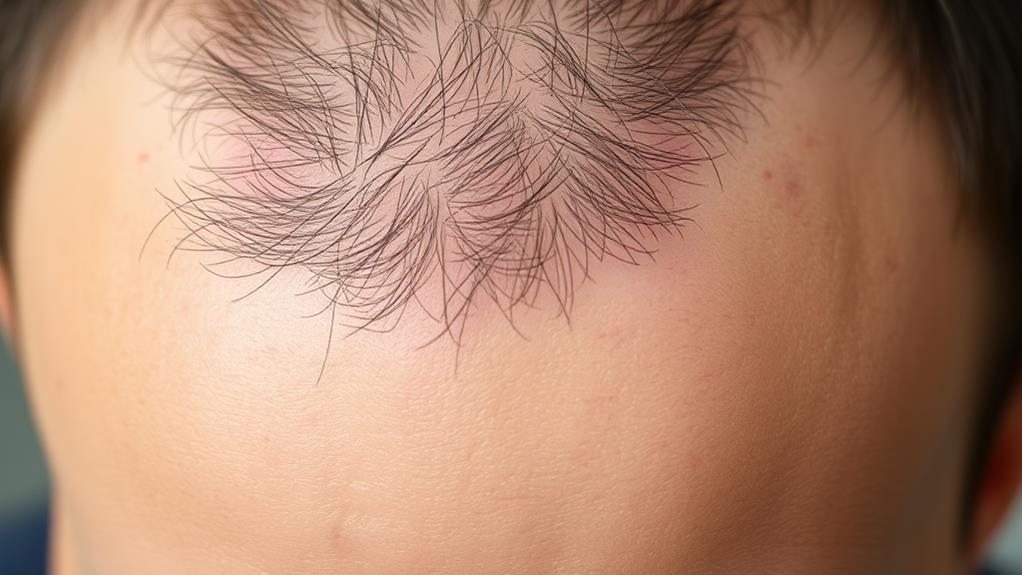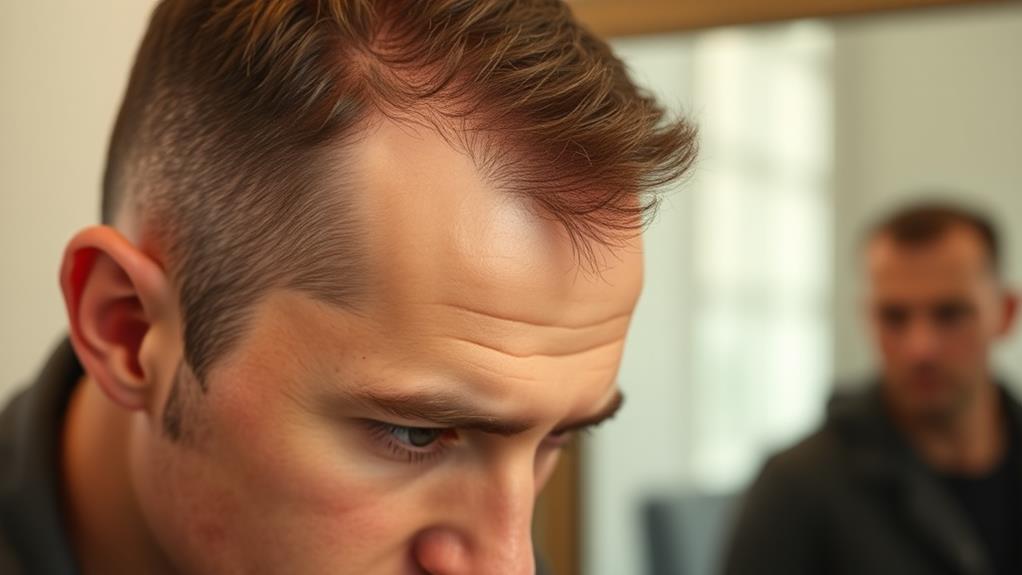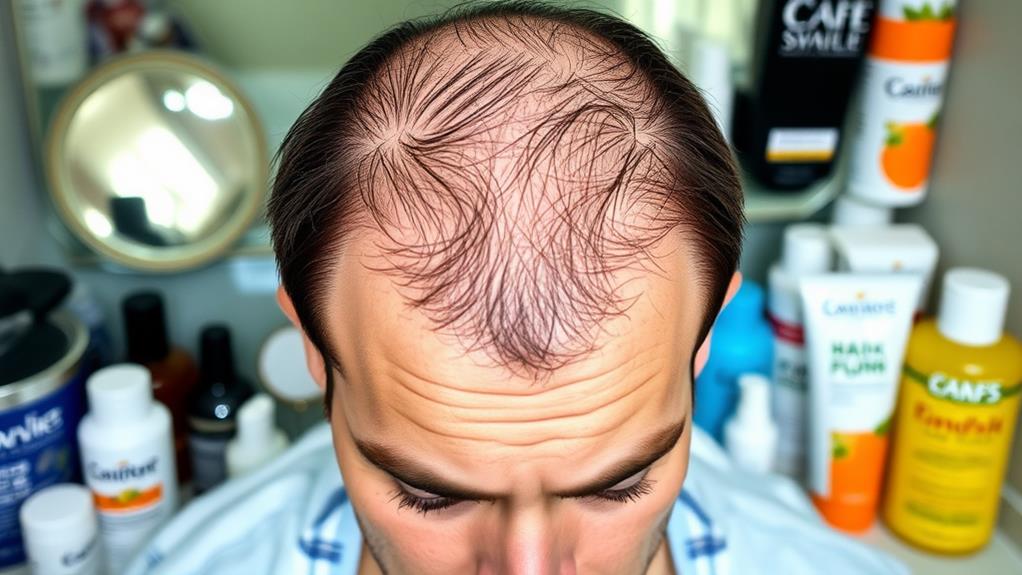If you've noticed your hairline starting to shift, you're not alone. A receding hairline affects many, and understanding the underlying causes can help you take control. From genetic factors to lifestyle choices, recognizing these elements is crucial for addressing your concerns. You might be wondering what steps you can take to slow down this process or even reverse it. As we explore prevention techniques and treatment options, you'll discover practical insights that could change your approach to hair care and boost your confidence. What does the journey toward healthier hair look like?
Key Takeaways
- A receding hairline is commonly caused by genetics and aging, leading to hair loss primarily at the temples or forehead.
- Early signs include thinning hair around the temples, increased hair loss during washing, and changes in hairline shape.
- Prevention techniques include maintaining a balanced diet, managing stress, and performing scalp massages to promote hair growth.
- Treatment options range from topical solutions like minoxidil to hair transplant surgery, requiring consultation for personalized plans.
- Seeking professional help is essential for rapid thinning or persistent hair loss to receive tailored advice and treatment options.
Understanding Receding Hairlines

Understanding receding hairlines starts with recognizing their common causes and patterns. You might notice that your hairline isn't as full as it used to be, or it's slowly creeping back like a sneaky thief. This change can happen to anyone, and it's often a normal part of aging. Your hairline may recede at the temples or along your forehead, forming an "M" shape.
Don't panic! It's essential to know that this isn't the end of the world. Many folks experience this, and it's often linked to genetics. If your parents had receding hairlines, there's a chance you might, too. Stress and hormonal changes can play a role, but they're not the main culprits.
Keep in mind, a receding hairline doesn't define you. Embracing the change can boost your confidence. You could try different hairstyles or even explore some light-hearted jokes about hair loss at parties.
Causes of Hair Loss
Many people wonder what drives hair loss, and it can stem from a variety of factors. The most common cause is genetics. If your family has a history of hair loss, you might find yourself in the same boat. But don't worry; it's not your fault!
Hormonal changes also play a big role. For instance, if you're going through puberty, pregnancy, or menopause, your body is juggling hormones that can affect your hair.
Stress is another sneaky culprit. When you're juggling school, friends, and maybe a part-time job, your body might respond by making some of your hair take an early vacation.
Nutritional deficiencies can also cause your hair to thin out. If you're not getting enough vitamins or minerals, your hair may suffer.
Certain medical conditions, like thyroid issues or autoimmune diseases, can also lead to hair loss.
And let's not forget about the fun stuff—hairstyling habits! Overuse of heat tools, tight hairstyles, or harsh chemicals can damage your hair and lead to breakage. So, keep an eye on what you're doing to your hair; it may just need a little TLC!
Early Signs to Notice

Noticing changes in your hair can be unsettling, especially when it comes to a receding hairline. You might start to see your hairline creeping back a little, like it's trying to escape from your forehead!
Look for signs like thinning hair around your temples or a larger forehead than before. If your hair feels less dense or you've found more hair in your brush, that's another clue.
You may also notice a different shape to your hairline. Instead of the nice, rounded look, it might start to look more like an M or a V.
Don't panic just yet! It's also important to pay attention to how your hair feels; if it's becoming brittle or breaking easily, that's something to keep an eye on too.
Prevention Techniques
While you can't always control genetics, there are several effective techniques to help prevent a receding hairline.
First, make sure you're eating a balanced diet. Foods rich in vitamins and minerals, like leafy greens, nuts, and fish, can strengthen your hair. Think of it as feeding your hair the best fuel possible!
Next, try to manage stress. Stress can play a sneaky role in hair loss, so practice relaxation techniques like yoga or meditation. You could even pick up a fun hobby to keep your mind off things.
Don't forget about your scalp! Gently massaging your scalp while shampooing can boost blood flow and promote hair growth. Just think of it as a mini spa day for your head!
Also, avoid harsh hairstyles that pull on your hair, like tight ponytails. They might look cute, but they can cause damage over time.
Treatment Options Available

If you've tried prevention techniques and still notice your hairline receding, it's time to explore treatment options that can help. You've got a few choices that might work for you.
First up, there's minoxidil, a topical solution that you apply to your scalp. It can stimulate hair growth and slow down thinning. Just remember, it takes a few months to see results, so don't give up too soon!
Another option is finasteride, an oral medication that helps block the hormone responsible for hair loss. It can be effective, but make sure to chat with your doctor about any potential side effects.
If you're looking for something more permanent, hair transplant surgery could be the answer. It involves moving hair follicles from one part of your scalp to another. It's a bigger commitment, but many people love the results!
Don't forget about laser therapy, which uses light to stimulate hair follicles. It's non-invasive and can be a fun way to treat your hairline.
Natural Remedies to Consider
Many people turn to natural remedies when seeking help for a receding hairline. If you're looking for a more holistic approach, there are several options you might consider.
One popular remedy is coconut oil. It's not just for cooking! Massaging warm coconut oil into your scalp can nourish hair follicles and keep your hair healthy.
Another option is essential oils. Rosemary oil, for instance, is known to promote hair growth. Just mix a few drops with a carrier oil, like jojoba, and apply it to your scalp. It smells nice, too!
Don't forget about the power of aloe vera. Applying fresh aloe vera gel can soothe your scalp and may reduce hair loss. Plus, who doesn't love a little spa treatment at home?
You might also try a blend of onion juice and honey. It sounds a bit odd, but many swear by it for boosting hair growth. Just apply it to your scalp, leave it for about 30 minutes, and rinse off.
Lifestyle Adjustments for Healthy Hair

To achieve and maintain healthy hair, making certain lifestyle adjustments can be just as crucial as any topical treatment.
First, watch what you eat! A balanced diet packed with vitamins and minerals can work wonders. Think leafy greens, nuts, and fish. Your hair loves omega-3 fatty acids, so treat it to some salmon or walnuts.
Next, stay hydrated. Drinking enough water helps keep your hair moisturized and shiny. Aim for at least eight glasses a day, but feel free to sip more if you're feeling thirsty.
Also, don't underestimate the power of stress management. Stress can lead to hair loss, so find ways to chill out. Whether it's practicing yoga, meditating, or just taking a walk, make time for activities that help you relax.
Hair Care Products to Use
Choosing the right hair care products is essential for tackling a receding hairline. When you're shopping, look for shampoos and conditioners that specifically mention hair thickening or volumizing. These can help give your hair that full look you might be craving.
You might find ingredients like biotin, caffeine, and saw palmetto on the labels—these are great for promoting hair health and growth.
Don't forget about hair oils! Natural oils like coconut, argan, and jojoba can work wonders. They moisturize your scalp and keep your hair shiny and manageable.
Plus, a little massage while applying them can boost blood circulation, which is always a bonus!
Styling products also play a role. Go for lightweight gels or mousses that won't weigh your hair down. You want your hair to look lively and bouncy, not flat and lifeless.
And hey, if you're feeling adventurous, consider trying a hair fiber product. It can create the illusion of thicker hair, and you'll look fabulous!
When to Seek Professional Help

Noticing a receding hairline can be unsettling, and it's important to recognize when it's time to seek professional help. If you're finding that your hair is thinning faster than usual, or if you notice bald patches, it's a good idea to consult a dermatologist or a hair specialist.
Don't wait until you feel like a chia pet gone wrong!
Also, if your hair loss is accompanied by itching, redness, or flaking, you should definitely reach out to a professional. These symptoms could signal an underlying issue that needs attention.
Remember, it's not just about hair; it's about your scalp's health too!
If you're feeling anxious or upset about your hair loss, talking to someone who understands can be really helpful. Professionals can offer tailored advice and treatment options that you mightn't know about.
Plus, they can help you separate fact from fiction regarding hair loss myths.
Boosting Confidence Amidst Hair Loss
While hair loss can feel overwhelming, it's crucial to remember that your self-worth isn't tied to your hair. You're so much more than the strands on your head! Embracing your new look can be a great way to boost your confidence.
First, consider a fresh haircut or a new style that works with your hair loss. A skilled barber or stylist can help you find a look that makes you feel fantastic!
Next, remember to focus on what you love about yourself. Whether it's your smile, your sense of humor, or your amazing talents, remind yourself daily of your strengths. Surround yourself with supportive friends who lift you up and make you laugh. After all, laughter is the best medicine!
Also, try exploring new hobbies or interests. Engaging in activities you enjoy can shift your focus away from hair loss and help you feel more fulfilled. Whether it's sports, art, or something else, find what makes you happy.
Lastly, don't forget that millions are in the same boat. You're not alone, and there are communities out there ready to support you! Embrace your journey, and let your confidence shine!

